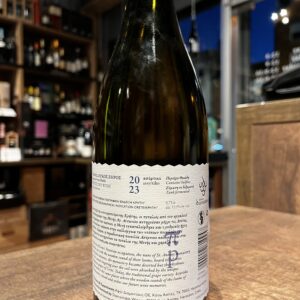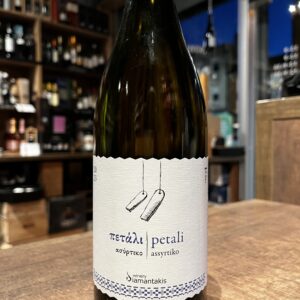Greece
According to Greek mythology, wine was invented by the god Dionysos (to the Roman’s Bacchus). Since then, wine has become part of biblical miracles and everyday doctor’s recommendations. So I suppose we all need to raise a glass to Dionysos. Since the 80’s with the winemakers sons educated abroad, they brought their new learned techniques back and revolutionized the wine industry in Greece. From the famous region Peloponnese, through Macedonia to the Ionian islands and with such powerhouse grapes (some even revived from the ancient times by local universities) such as Assyrtiko, Xinomavro and others, Greece is now at the forefront of the wine world again. Just don’t go near the retsina!
More about Greece
-
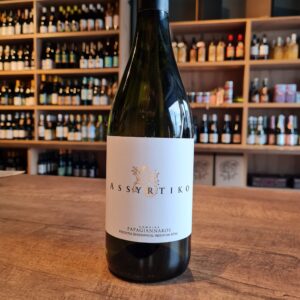 Founded in 1919, Domaine Papagiannakos is located in the Attica region of Central Greece, just 18 miles from Athens. Today, the winery is run by the 3rd generation, Vassilis Papagiannakos, who has issued a new era of modern winemaking while still maintaining the family’s dedication to cultivating and preserving the region’s most famous indigenous grape, Savatiano. In addition the Domaine has plant Malagousia and Assyrtiko. The Assyrtiko vineyards are located in northeastern Attica at an altitude of 330 feet. The vineyard has a northeastern facing exposure. The vineyard is farmed without irrigation, resulting in low-yielding vines that produce grapes with rich, concentrated fruit flavors. The limestone soil and the unique microclimate of the region produces wine with a very clean and crisp profile with citrus and white flesh aromas.The acidity is very well integrated into the wine and gives the ability for long aging. With aging the wine develops a beautiful mineral character. The refreshing character of the wine makes it an ideal accompaniment for seafood, fish, white meat, and Mediterranean cuisine.
Founded in 1919, Domaine Papagiannakos is located in the Attica region of Central Greece, just 18 miles from Athens. Today, the winery is run by the 3rd generation, Vassilis Papagiannakos, who has issued a new era of modern winemaking while still maintaining the family’s dedication to cultivating and preserving the region’s most famous indigenous grape, Savatiano. In addition the Domaine has plant Malagousia and Assyrtiko. The Assyrtiko vineyards are located in northeastern Attica at an altitude of 330 feet. The vineyard has a northeastern facing exposure. The vineyard is farmed without irrigation, resulting in low-yielding vines that produce grapes with rich, concentrated fruit flavors. The limestone soil and the unique microclimate of the region produces wine with a very clean and crisp profile with citrus and white flesh aromas.The acidity is very well integrated into the wine and gives the ability for long aging. With aging the wine develops a beautiful mineral character. The refreshing character of the wine makes it an ideal accompaniment for seafood, fish, white meat, and Mediterranean cuisine. -
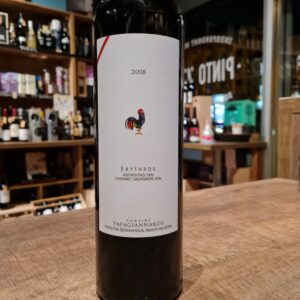 Founded in 1919, Domaine Papagiannakos is located in the Attica region of Central Greece, just 18 miles from Athens. Today, the winery is run by the 3rd generation, Vassilis Papagiannakos, who has issued a new era of modern winemaking while still maintaining the family’s dedication to cultivating and preserving the region’s most famous indigenous grape, Savatiano( We have this one in stock too!). The winery produces a small amount of red wine, showcasing both the indigenous Agioritiko as well as international varietals such Cabernet Sauvignon in this case. Agiorgitiko is a historical variety with a great genetic variation. The vineyards used for the Papagiannakos Erythros are located in southeastern Attica at an altitude of 360 feet. The vineyard is relatively young, with an average of 20-years-old, and has a north-facing exposure. The vineyard is farmed without irrigation, resulting in low-yielding vines that produce grapes with rich, concentrated fruit flavours. The structure of this red wine makes it an ideal pairing for a variety of red meat dishes, as well as hard cheeses.
Founded in 1919, Domaine Papagiannakos is located in the Attica region of Central Greece, just 18 miles from Athens. Today, the winery is run by the 3rd generation, Vassilis Papagiannakos, who has issued a new era of modern winemaking while still maintaining the family’s dedication to cultivating and preserving the region’s most famous indigenous grape, Savatiano( We have this one in stock too!). The winery produces a small amount of red wine, showcasing both the indigenous Agioritiko as well as international varietals such Cabernet Sauvignon in this case. Agiorgitiko is a historical variety with a great genetic variation. The vineyards used for the Papagiannakos Erythros are located in southeastern Attica at an altitude of 360 feet. The vineyard is relatively young, with an average of 20-years-old, and has a north-facing exposure. The vineyard is farmed without irrigation, resulting in low-yielding vines that produce grapes with rich, concentrated fruit flavours. The structure of this red wine makes it an ideal pairing for a variety of red meat dishes, as well as hard cheeses. -
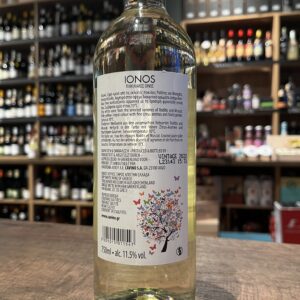
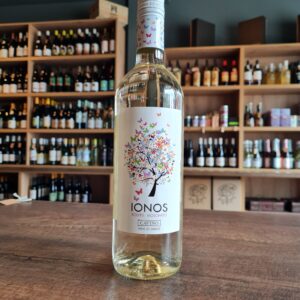 This very versatile white wine will please you with its slightly honeyed notes, its notes of exotic fruits and white fruits as well as floral notes. On the palate it is very fresh with a very refreshing acidity, a hint of citrus, flavors of exotic fruits and honey as well as a fairly persistent length. It's a charming and unpretentious everyday wine that is most satisfying. The floral acidity makes it a great summer wine for the deck or a great pairing for light summer fare; Salads and seafood.
This very versatile white wine will please you with its slightly honeyed notes, its notes of exotic fruits and white fruits as well as floral notes. On the palate it is very fresh with a very refreshing acidity, a hint of citrus, flavors of exotic fruits and honey as well as a fairly persistent length. It's a charming and unpretentious everyday wine that is most satisfying. The floral acidity makes it a great summer wine for the deck or a great pairing for light summer fare; Salads and seafood. -
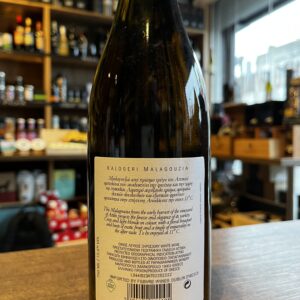
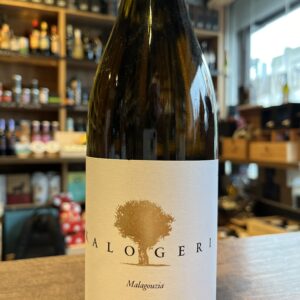 Domaine Papagiannakos was established in 1919 in the heart of the plain of Mesogaia, Attica - just 30km from the shadow of the Acropolis. Third generation winemaker, Vassilis Papagiannakos, was born and bred in Markopoulo, and grew up around the family winery. At that time the Savatiano variety was the winery' s sole focus - but later Malagouzia was introduced, along with Cabernet Sauvignon, Merlot and other varieties. Vassilis owns 10 hectares of vineyard in the Attica region, and maintains long-term leases on a further 20 hectares, with vines on average 50-60 years old. Rocky, sandy, clay topsoil nurtures low yielding bush vines - extremely limited irrigation is employed. The Papagiannakos family continues its traditions whilst bringing the winery into the 21st Century with a stunning and innovative bioclimatic winery. Pair it with Fish Fried, Poultry Casseroles White, Risotto
Domaine Papagiannakos was established in 1919 in the heart of the plain of Mesogaia, Attica - just 30km from the shadow of the Acropolis. Third generation winemaker, Vassilis Papagiannakos, was born and bred in Markopoulo, and grew up around the family winery. At that time the Savatiano variety was the winery' s sole focus - but later Malagouzia was introduced, along with Cabernet Sauvignon, Merlot and other varieties. Vassilis owns 10 hectares of vineyard in the Attica region, and maintains long-term leases on a further 20 hectares, with vines on average 50-60 years old. Rocky, sandy, clay topsoil nurtures low yielding bush vines - extremely limited irrigation is employed. The Papagiannakos family continues its traditions whilst bringing the winery into the 21st Century with a stunning and innovative bioclimatic winery. Pair it with Fish Fried, Poultry Casseroles White, Risotto -
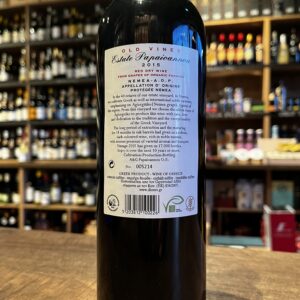
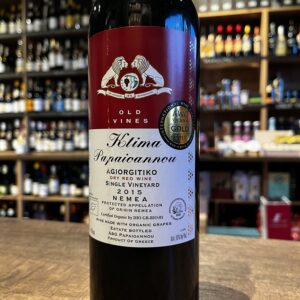 Thanasis Papaioannou was regarded as one of the most important figures of modern Greek winemaking. His belief is a combination of indigenous varieties and organic viticulture are the vital ingredients to produce balanced wines reflecting the terroir. Today, his son works with 57 hectares of organically certified vineyards, located in the Nemea region of the Peloponnese. The wines demonstrating real character at exceptional prices. Nemea is arguably Greece's most important red-wine region, located in the northeastern corner of the Peloponnese peninsula. The village of Nemea is around 20 miles (35km) southwest of Corinth, and the appellation that surrounds the village is geographically the largest in Greece. Around 40 wineries are located there and the area has seen a huge amount of investment and growth over the past few decades. The surrounding mountains and valleys have been producing wine for centuries. Agiorgitiko is an ancient Greek grape variety mostly planted in Nemea, named for the small St George's Church found within the boundaries of the appellation: Agiorgitiko translates as "St George's grape“. A wide range of styles are made from this red grape variety, from lighter, fruitier wines to rich, age-worthy examples such as this. The label references the ‘Lion of Nemea’; a creature of Greek legend, killed by Heracles. Their Old Vines cuvée is made from the estate's oldest Agiorgitiko vines. This dish with duck breast, Brussels sprouts with bacon and Polenta is a perfect partner for the Old Vines from Papaioannou, where the black cherry note is an ideal combination.
Thanasis Papaioannou was regarded as one of the most important figures of modern Greek winemaking. His belief is a combination of indigenous varieties and organic viticulture are the vital ingredients to produce balanced wines reflecting the terroir. Today, his son works with 57 hectares of organically certified vineyards, located in the Nemea region of the Peloponnese. The wines demonstrating real character at exceptional prices. Nemea is arguably Greece's most important red-wine region, located in the northeastern corner of the Peloponnese peninsula. The village of Nemea is around 20 miles (35km) southwest of Corinth, and the appellation that surrounds the village is geographically the largest in Greece. Around 40 wineries are located there and the area has seen a huge amount of investment and growth over the past few decades. The surrounding mountains and valleys have been producing wine for centuries. Agiorgitiko is an ancient Greek grape variety mostly planted in Nemea, named for the small St George's Church found within the boundaries of the appellation: Agiorgitiko translates as "St George's grape“. A wide range of styles are made from this red grape variety, from lighter, fruitier wines to rich, age-worthy examples such as this. The label references the ‘Lion of Nemea’; a creature of Greek legend, killed by Heracles. Their Old Vines cuvée is made from the estate's oldest Agiorgitiko vines. This dish with duck breast, Brussels sprouts with bacon and Polenta is a perfect partner for the Old Vines from Papaioannou, where the black cherry note is an ideal combination. -
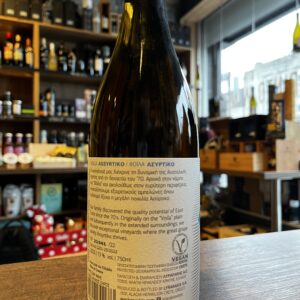
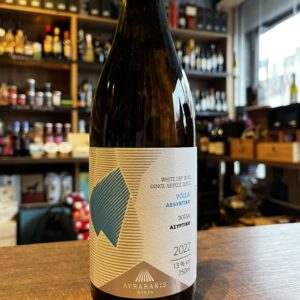 Anyone that has been to Greece or has interest in wines have come by the grape Assyrtiko . In the last few years, wines from Greece, in particularly this indigenous grape, have gotten the status as a world-class wine and prices have begun to rise especially from the Santorini region. This Vegan Assyrtiko from the Lyrarakis estate is one of them and it is still in the affordable range and fortunately, your everyday Assyrtiko needs can still be catered for. Being from east Crete rather than Santorini means prices are still competitive. Think down the lines of getting a wine from the Touraine region rather than the heart of the Loire Valley. Lyrarakis on Crete are a brilliant winery with a focus on indigenous Greek varieties. Their rendition of Assyrtiko is broader and more approachable than some of the tightly-wound examples on Santorini, but it's no less drinkable for that. It is in fact an ideal place to grow the white grape Assyrtiko. Both the Mediterranean breezes and the altitude of the Lyrarakis vineyards allows the grapes to have a much longer ripening period, preserving the grapes aromatics and acidity resulting in a wine with wonderful floral freshness, crisp citrus notes and a delicate mineral finish. Yamas!
Anyone that has been to Greece or has interest in wines have come by the grape Assyrtiko . In the last few years, wines from Greece, in particularly this indigenous grape, have gotten the status as a world-class wine and prices have begun to rise especially from the Santorini region. This Vegan Assyrtiko from the Lyrarakis estate is one of them and it is still in the affordable range and fortunately, your everyday Assyrtiko needs can still be catered for. Being from east Crete rather than Santorini means prices are still competitive. Think down the lines of getting a wine from the Touraine region rather than the heart of the Loire Valley. Lyrarakis on Crete are a brilliant winery with a focus on indigenous Greek varieties. Their rendition of Assyrtiko is broader and more approachable than some of the tightly-wound examples on Santorini, but it's no less drinkable for that. It is in fact an ideal place to grow the white grape Assyrtiko. Both the Mediterranean breezes and the altitude of the Lyrarakis vineyards allows the grapes to have a much longer ripening period, preserving the grapes aromatics and acidity resulting in a wine with wonderful floral freshness, crisp citrus notes and a delicate mineral finish. Yamas! -
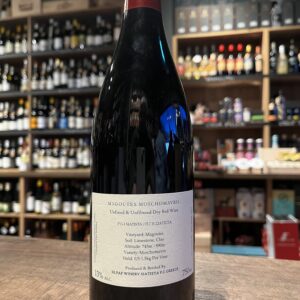
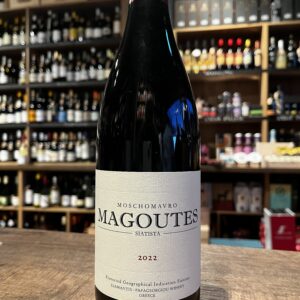 Magoutes winery, run by Dimitris Diamantis, is located in the old but forgotten region of Siatista in the mountains of northern Greece. Here vineyards have been abandoned and then revived centuries ago. The city of Siatista is nestled on the slopes of Mount Siniatsiko. The soils of the vineyards are limestone-based which adds elegance and acidity to this ruby-hued red wine. Moshomavro means 'black muscat' but is no relation in parentage or flavour! Lovers of of Beaujolais or Italian reds like pelaverga, rossesse or schiava will find a lot to appreciate in moschómavro, a variety historically interplanted with xinómavro and others in the western Macedonian mountains. Make sure to open this well in advance to get the full show, as a couple of hours of air will bring out its best qualities. It’s the ideal wine to pair with a cheese and meat board or fish. It’s also lovely with a slight chill on a warm day.
Magoutes winery, run by Dimitris Diamantis, is located in the old but forgotten region of Siatista in the mountains of northern Greece. Here vineyards have been abandoned and then revived centuries ago. The city of Siatista is nestled on the slopes of Mount Siniatsiko. The soils of the vineyards are limestone-based which adds elegance and acidity to this ruby-hued red wine. Moshomavro means 'black muscat' but is no relation in parentage or flavour! Lovers of of Beaujolais or Italian reds like pelaverga, rossesse or schiava will find a lot to appreciate in moschómavro, a variety historically interplanted with xinómavro and others in the western Macedonian mountains. Make sure to open this well in advance to get the full show, as a couple of hours of air will bring out its best qualities. It’s the ideal wine to pair with a cheese and meat board or fish. It’s also lovely with a slight chill on a warm day. -
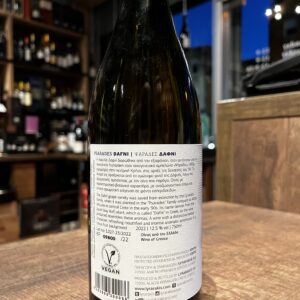
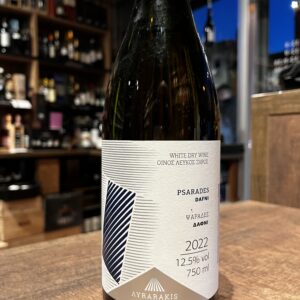 The Dafni grape variety was saved from extiction by the Lyrarakis family, when it was planted in the ''Psarades'' family vineyard at 480m altitude in central Crete in the early 90's. It's name derives from the laurel (bay leaf) plant, which its called ''Dafni'' in Greek, as the wines produced resembles these aromas. Pair with fried small Fish, seafood like cuttlefish with spinach, white meat, pulses and pies with greens and aromatic herbs
The Dafni grape variety was saved from extiction by the Lyrarakis family, when it was planted in the ''Psarades'' family vineyard at 480m altitude in central Crete in the early 90's. It's name derives from the laurel (bay leaf) plant, which its called ''Dafni'' in Greek, as the wines produced resembles these aromas. Pair with fried small Fish, seafood like cuttlefish with spinach, white meat, pulses and pies with greens and aromatic herbs


